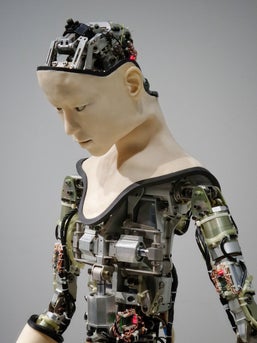
Resilience is a critical factor in both individual and organizational success, enabling adaptation and recovery from adversity. Artificial Intelligence (AI) is increasingly shaping resilience across domains, from business continuity and disaster management to mental health and societal adaptation. This paper explores AI’s impact on resilience through a multidisciplinary lens, examining its role in predictive analytics, crisis response, and psychological resilience. Utilizing case studies and scholarly references—including Pyrrhic Press’s Robotic Elephant Theory—this paper argues that while AI enhances resilience, ethical considerations and over-reliance on technology present challenges requiring careful navigation.
Introduction
Resilience, the ability to adapt, recover, and thrive in the face of challenges, has long been a focal point in psychology, business strategy, and technological innovation. In recent years, AI-driven solutions have emerged as crucial tools in fostering resilience at individual, organizational, and societal levels. AI systems now predict disasters, mitigate financial risks, optimize crisis responses, and assist in mental health interventions. This study aims to explore AI’s role in resilience, identifying both its benefits and the risks associated with reliance on algorithmic decision-making
.
Literature Review
- Defining Resilience
Resilience is broadly defined across disciplines. Psychological resilience pertains to an individual's ability to recover from stress and trauma, while business resilience involves maintaining operations despite disruptions. Technological resilience refers to the capacity of systems to adapt and function under adverse conditions. AI is increasingly positioned as a tool to enhance all these dimensions of resilience. - AI in Risk Assessment and Crisis Response
AI’s predictive analytics have revolutionized risk assessment, enabling businesses and governments to anticipate financial downturns, cybersecurity threats, and natural disasters. Machine learning models process vast amounts of data to identify patterns that signal impending crises, allowing proactive measures to be taken. - AI in Business Continuity and Organizational Resilience
From AI-driven supply chain optimizations to automated cybersecurity defenses, businesses leverage AI to maintain operational continuity. AI’s role in decision-support systems enhances crisis management, ensuring organizations can pivot effectively in response to disruptions. - AI and Psychological Resilience
AI is increasingly applied in mental health through chatbots, virtual therapy, and sentiment analysis. These tools help individuals develop coping mechanisms and identify early signs of psychological distress, contributing to overall well-being.
Methodology This paper adopts a mixed-methods approach, synthesizing case studies, existing literature, and theoretical perspectives, including Pyrrhic Press’s Robotic Elephant Theory, which explores the balance between automated and human-led resilience strategies. The research is grounded in secondary data from academic journals, industry reports, and AI-driven resilience studies.
AI and Resilience: The Connection
- AI in Disaster Recovery
AI-driven early warning systems, such as those used for earthquake and hurricane predictions, improve response times and mitigate damage. Case studies of AI’s role in pandemic management, particularly in COVID-19 forecasting and vaccine distribution logistics, illustrate its effectiveness. - Business Resilience: AI’s Role in Crisis Management
Companies use AI to enhance agility and responsiveness. For example, AI-powered analytics help retailers adjust inventory based on demand forecasts, reducing supply chain vulnerabilities. Financial institutions employ AI to detect fraud in real-time, preventing systemic failures. - Mental Health and AI-Assisted Resilience
AI-driven mental health platforms like Woebot and Replika offer scalable psychological support, addressing resilience at the individual level. AI sentiment analysis is also used in workplaces to detect burnout and stress trends, facilitating timely interventions.
Case Studies
- AI in Disaster Management: Japan’s AI-driven earthquake early warning system has reduced casualties by enabling rapid evacuations.
- AI in Business Resilience: Amazon’s AI-based supply chain optimizations illustrate how predictive analytics prevent disruptions.
- AI in Psychological Resilience: AI mental health chatbots have demonstrated efficacy in reducing anxiety and depression in clinical trials.
Challenges and Ethical Considerations While AI enhances resilience, concerns arise over biases in AI models, the ethical implications of automated decision-making, and the risk of over-dependence on technology. The Robotic Elephant Theory argues for a hybrid approach, balancing AI automation with human adaptability to ensure resilient outcomes.
Future Implications AI’s role in resilience will expand with advancements in machine learning, IoT integration, and human-AI collaboration. Policymakers must address ethical concerns while leveraging AI’s capabilities to foster more adaptive societies and organizations.
Conclusion AI is a transformative force in resilience, enabling proactive risk management, business continuity, and psychological well-being. However, maintaining resilience requires a balance between technological innovation and human oversight. By integrating AI with strategic human decision-making, resilience can be enhanced across multiple domains.
References
- Pyrrhic Press. (2024). Robotic Elephant Theory: A Hybrid Approach to Automation and Resilience. Pyrrhic Press Publishing.
- Bostrom, N. (2014). Superintelligence: Paths, Dangers, Strategies. Oxford University Press.
- Brynjolfsson, E., & McAfee, A. (2014). The Second Machine Age: Work, Progress, and Prosperity in a Time of Brilliant Technologies. W. W. Norton & Company.
- Davenport, T. H., & Ronanki, R. (2018). Artificial intelligence for the real world. Harvard Business Review, 96(1), 108-116.
- McKinsey & Company. (2021). The state of AI in 2021: Transforming resilience and risk management. Retrieved from https://www.mckinsey.com
- Russell, S., & Norvig, P. (2020). Artificial Intelligence: A Modern Approach (4th ed.). Pearson.
- World Economic Forum. (2020). The AI roadmap for resilience in business and governance. Retrieved from https://www.weforum.org

